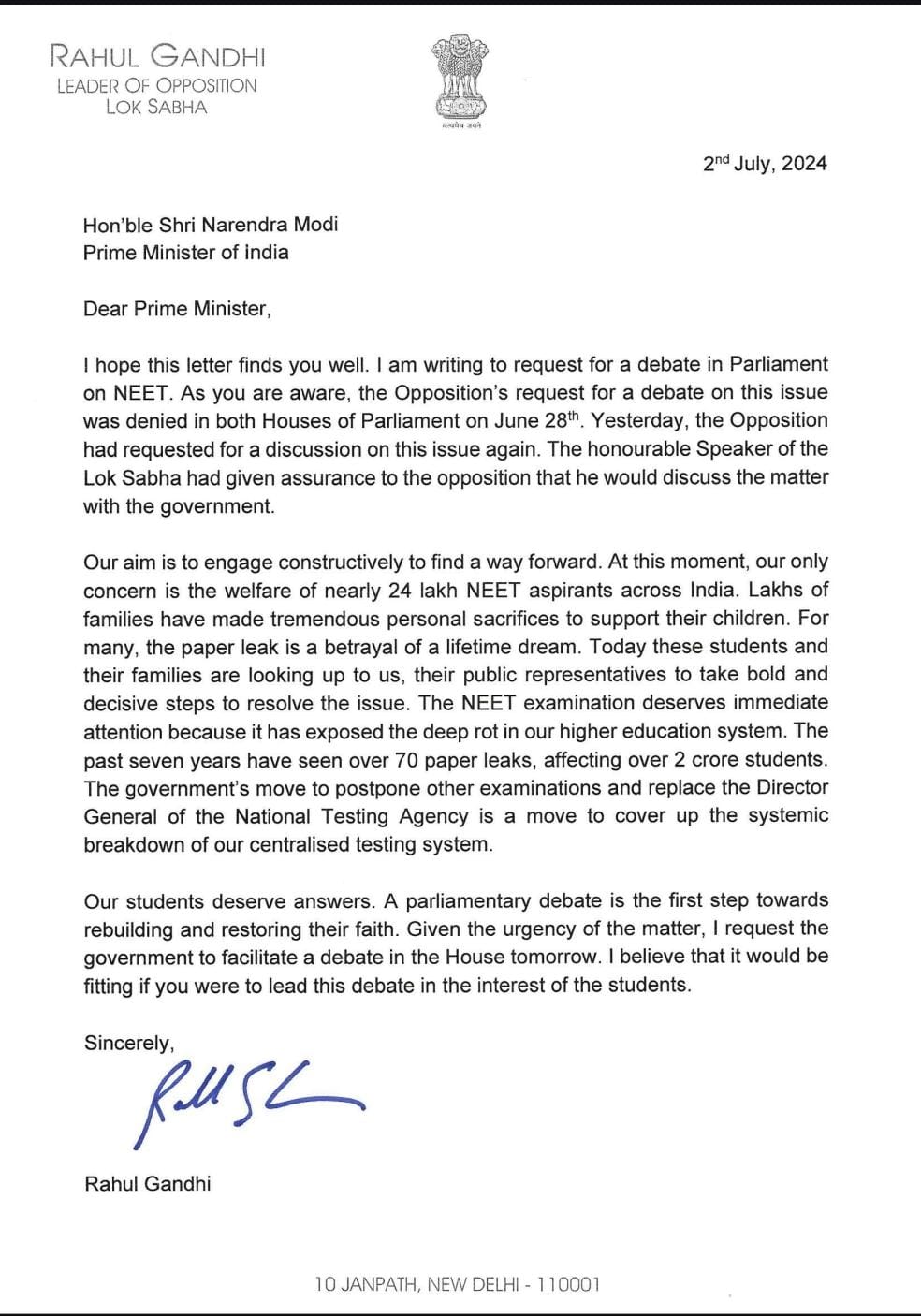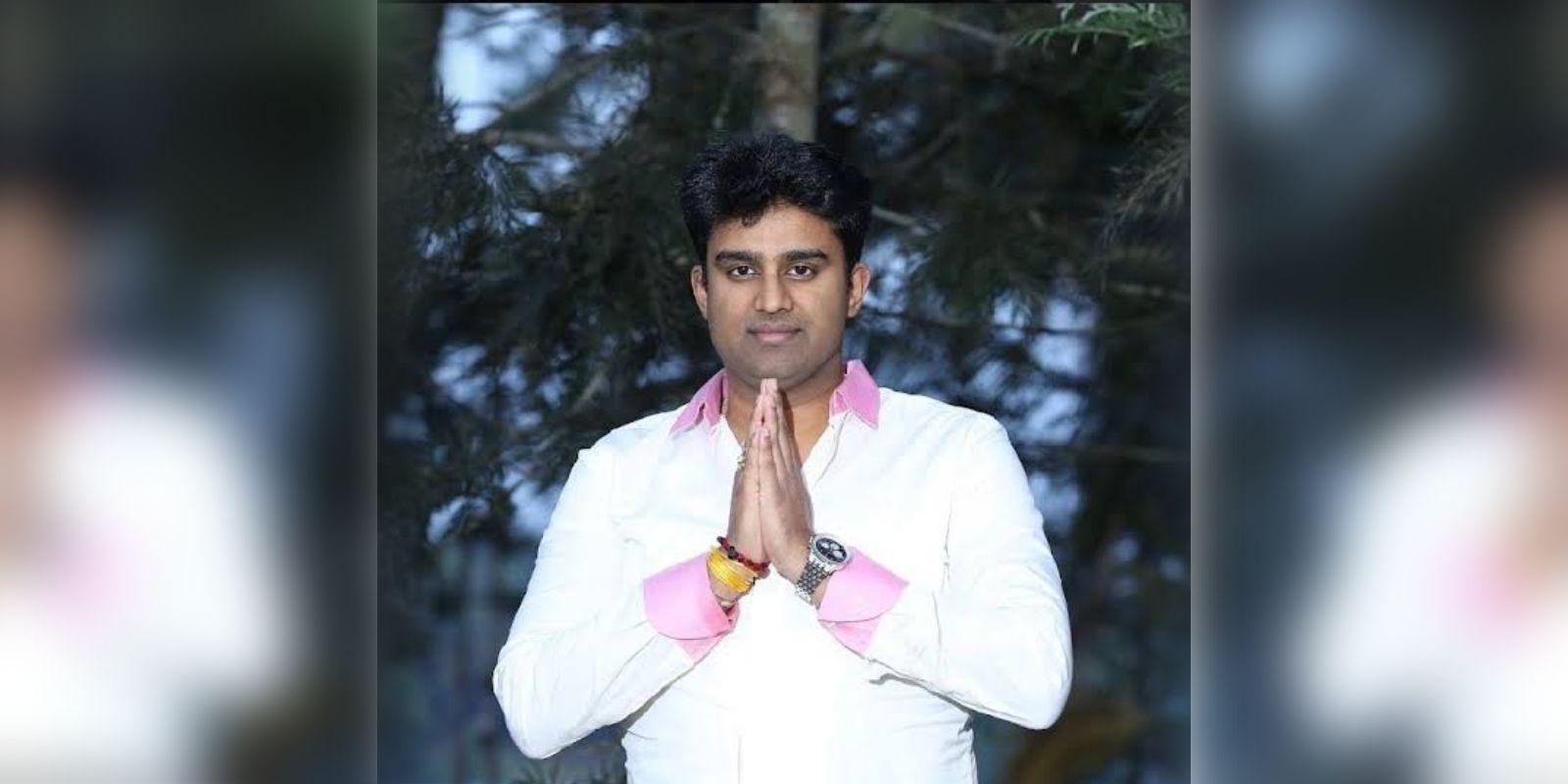Rahul Gandhi calls for an urgent debate on the NEET exam in Parliament, addressing concerns over repeated paper leaks impacting millions of students. He urges PM Modi to lead the discussion to restore trust in India’s education system.
In a fervent appeal to Prime Minister Narendra Modi, Congress leader Rahul Gandhi has called for an immediate parliamentary debate on the NEET exam controversy. Highlighting the ongoing concerns about the National Eligibility cum Entrance Test (NEET), which has been marred by numerous instances of paper leaks, Gandhi emphasized the urgency of addressing the issue to safeguard the future of millions of students.
Gandhi, in his letter to the Prime Minister, underscored the Opposition’s persistent efforts to initiate a debate on the NEET exam, which were rebuffed in both Houses of Parliament on June 28. “Our aim is to engage constructively to find a way forward,” he wrote. “At this moment, our only concern is the welfare of nearly 24 lakh NEET aspirants across India. Lakhs of families have made tremendous personal sacrifices to support their children. For many, the paper leak is a betrayal of a lifetime dream.”
The Congress leader noted that in the past seven years, over 70 such leaks have disrupted the lives of more than 2 crore students. Criticizing the government’s response, Gandhi argued that postponing other examinations and replacing the Director General of the National Testing Agency (NTA) are superficial solutions that fail to address the root causes of the problem. “The government’s move to postpone other examinations and replace the Director General of the National Testing Agency is a move to cover up the systemic breakdown of our centralized testing system. Our students deserve answers,” he asserted.
The Broader Implications of NEET Leaks
The recurring leaks of the NEET exam papers have raised significant concerns not only about the integrity of the exam but also about the broader implications for India’s education system. These leaks undermine the trust in a system that is supposed to be a fair and impartial gateway to higher education. When such a system fails, it not only affects the immediate prospects of students but also erodes public confidence in educational institutions and their processes.
The NEET exam is a crucial milestone for students aspiring to enter medical colleges. Given its importance, the repeated breaches in its security are particularly alarming. Students prepare for years, often under significant pressure and at great personal and financial expense. The widespread leaks suggest systemic flaws that need to be addressed urgently. The government’s current measures, such as postponing exams and replacing officials, seem to be temporary fixes rather than solutions to the underlying issues.
Government’s Role and Responsibility
Gandhi’s call for a parliamentary debate on the NEET exam underscores the need for a comprehensive approach to tackle the problem. The government has a responsibility to ensure that the testing mechanisms are robust and secure. This involves not just reactive measures but also proactive reforms to prevent future occurrences. The debate on the NEET exam in Parliament, as suggested by Gandhi, could serve as a platform to discuss and implement long-term solutions.
A Call for Systemic Reform
To truly address the issue, there needs to be a focus on systemic reform. This includes overhauling the security protocols for exam paper handling, implementing more stringent checks and balances, and perhaps considering alternative methods of assessment. Additionally, there needs to be greater transparency in how these exams are conducted and how breaches are handled. The involvement of independent bodies to audit and oversee the examination process could also be a step towards rebuilding trust.
Impact on Students and Families
The emotional and psychological toll on students and their families cannot be overstated. The anxiety and stress caused by such uncertainties can have long-lasting effects. For many students, the NEET exam is not just an exam but a pivotal point in their academic and professional careers. The breaches in the exam’s integrity feel like a personal betrayal to these aspirants who have invested so much in their preparation.
In his letter, Rahul Gandhi has articulated a pressing concern that resonates with millions of students and their families across India. His call for an immediate parliamentary debate on the NEET exam is not just a political move but a necessary step towards addressing a grave issue that threatens the future of countless young aspirants. By facilitating this debate on the NEET exam, Prime Minister Modi and the government have the opportunity to demonstrate their commitment to educational integrity and the welfare of students.
The NEET exam controversy is a wake-up call for comprehensive reforms in the examination system. Addressing these challenges head-on will require a collaborative effort from all stakeholders, including policymakers, educational institutions, and the students themselves. Only through such concerted efforts can the trust in India’s education system be restored, ensuring that it remains a fair and reliable pathway to academic and professional success. The debate on the NEET exam is a critical first step in this direction, and it is imperative that it takes place without delay.
In summary, the debate on the NEET exam is a vital step towards resolving the ongoing issues and restoring faith in the educational system. The urgent need for a debate on the NEET exam cannot be overstated, and it is crucial that this matter is addressed promptly to ensure the future of India’s students and their educational aspirations.
For further insights and comprehensive content, please visit our homepage



